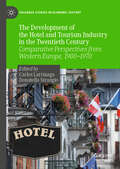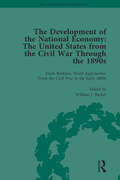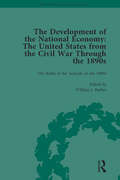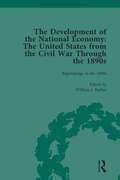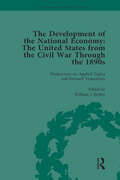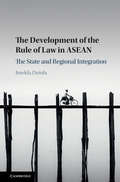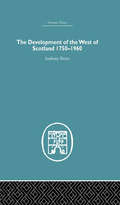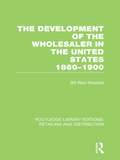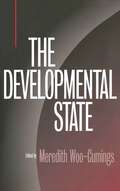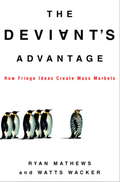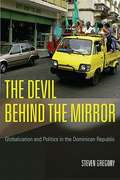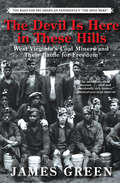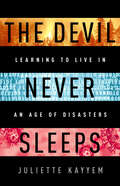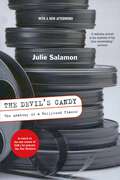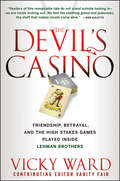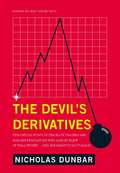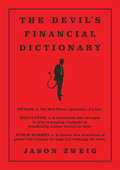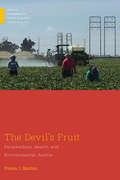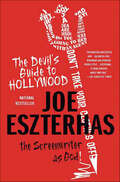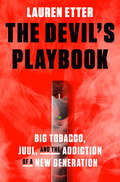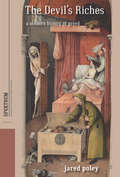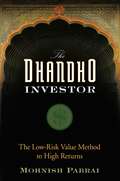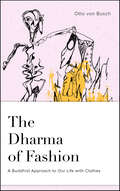- Table View
- List View
The Development of the Hotel and Tourism Industry in the Twentieth Century: Comparative Perspectives from Western Europe, 1900–1970 (Palgrave Studies in Economic History)
by Donatella Strangio Carlos LarrinagaThis edited collection explores the pivotal role of the hotel industry in building Western Europe’s tourism economy during the 20th century. The book brings together ten contributions focused on the same period, 1900-1970, to offer comparative perspectives from across the region including Italy, Switzerland, France, Spain and Britain. Drawing on historical case studies, chapters illuminate the different factors linking hotels and the broader tourism system including interventions of the public authorities and the State, the importance of private involvement, commercial strategies, the medium-term development of private hotels, hotel entrepreneurship, and the impact of economic crises and wars. By placing differing national approaches taken to the growth of the hotel industry in comparison, the book aims to fill a gap in the historiography of European hospitality and shed light on the wider impact of hotels and tourism on economic development at both a national and regional level. It will be of interest to a range of scholars, including in economic and business history, tourism studies, the history of tourism management, and social history.
The Development of the National Economy Vol 1: The United States from the Civil War Through the 1890s
by William J BarberThis collection brings together a comprehensive selection of documents from the history of US and Canadian economic thought from the 17th century through to 1900.
The Development of the National Economy Vol 2: The United States from the Civil War Through the 1890s
by William J BarberThis collection brings together a comprehensive selection of documents from the history of US and Canadian economic thought from the 17th century through to 1900.
The Development of the National Economy Vol 3: The United States from the Civil War Through the 1890s
by William J BarberThis collection brings together a comprehensive selection of documents from the history of US and Canadian economic thought from the 17th century through to 1900.
The Development of the National Economy Vol 4: The United States from the Civil War Through the 1890s
by William J BarberThis collection brings together a comprehensive selection of documents from the history of US and Canadian economic thought from the 17th century through to 1900.
The Development of the Rule of Law in ASEAN: The State and Regional Integration
by Imelda DeinlaAn interdisciplinary work that comparatively studies rule of law practices and the relationship between the rule of law and regional integration, a topic largely explored in European integration. By looking at the function of the rule of law in ASEAN rather than what it 'means' measured on normative conception, the book situates the rule of law in broader institutional and political processes in the member states and in regional relations to show the motivations of member states in adopting a peculiar type of regional architecture. It asks whether forging the rule of law in the region can help build it internally for member states. The book revisits discourses on the 'spill-over' of economic integration, the impact of globalization in reshaping the state and generating new tools of the rule of law. It makes a comprehensive comparison - the European Union, Africa Union and MERCOSUR - showing the uneven pathways to rule of law in various contexts.
The Development of the West of Scotland 1750-1960
by Anthony SlavenThe economic and social problems of modern Scotland are at the centre of current debate about regional economic growth, social improvement and environmental rehabilitation. In this book, as relevant today as when it was first published in 1975, Anthony Slaven argues that the extent and causes of these problems are frequently underestimated, thus making development policies less than fully effective. The major economic and social weaknesses of the west of Scotland are shown to be rooted in the regions former strengths. The author demonstrates how, although the region and its people have resisted change, a thriving and self reliant nineteenth-century economy , based on local resources and manpower, has given way in the present century to vanishing skills and products, unemployment and social deprivation. Since 1945 economic and social planning has helped to improve the situation, although many difficulties remain. Seen in the historical perspective provided by this revealing study, the present industrial problems of the west of Scotland, and their remedies, become clearer. Mr Slaven argues that the older industries deserve more help, for without this, he believes, the ineffectiveness of development policies is likely to be perpetuated. This book was first published in 1975.
The Development of the Wholesaler in the United States 1860-1900 (Routledge Library Editions: Retailing and Distribution)
by Bill Reid MoeckelAlthough the scientific study of marketing is relatively new, certain aspects of it have been analyzed in considerable detail. A body of literature exists, for example, on the various phases of retailing and advertising. It is only in the last decade or two, however, that much attention has been given to the study of wholesalers and wholesaling. The field occupies an important place in the economy, and in this study of the development of the wholesaler in the United States, Bill Reid Moeckel provides the historical basis for understanding the present nature of the wholesaling business, with pointers for the future of the wholesaler and the wider retail economy in which it resides. First published 1986.
The Developmental State (Cornell Studies in Political Economy Series)
by Meredith Woo-CumingsDevelopmental state, n.: the government, motivated by desire for economic advancement, intervenes in industrial affairs. <p><p> The notion of the developmental state has come under attack in recent years. Critics charge that Japan's success in putting this notion into practice has not been replicated elsewhere, that the concept threatens the purity of freemarket economics, and that its shortcomings have led to financial turmoil in Asia. In this informative and thought-provoking book, a team of distinguished scholars revisits this notion to assess its continuing utility and establish a common vocabulary for debates on these issues. Drawing on new political and economic theories and emphasizing recent events, the authors examine the East Asian experience to show how the developmental state involves a combination of political, bureaucratic, and moneyed influences that shape economic life in the region. <p><p> Taking as its point of departure Chalmers Johnson's account of the Japanese developmental state, the book explores the interplay of forces that have determined the structure of opportunity in the region. The authors critically address the argument for centralized political involvement in industrial development (with a new contribution by Johnson), describe the historical impact of colonialism and the Cold War, consider new ideas in economics, and compare the experiences of East Asian countries with those of France, Brazil, Mexico, and India.
The Deviant's Advantage: How Fringe Ideas Create Mass Markets
by Ryan Mathews Watts WackerBusiness consultants Mathews and Wacker argue that all new ideas are seen as deviant at their beginnings. They suggest that there is a linear process by which deviant ideas enter the mainstream and that by analyzing that process entrepreneurs can take advantage of profit-making opportunities that others might miss. They sprinkle their advice with pop-cultural references. Annotation c. Book News, Inc., Portland, OR (booknews.com)
The Devil Behind the Mirror: Globalization and Politics in the Dominican Republic
by Steven GregorySteven Gregory provides a compelling and intimate account of the impact that transnational processes associated with globalization are having on the lives and livelihoods of people in the Dominican Republic. Grounded in ethnographic fieldwork conducted in the adjacent towns of Boca Chica and Andrés, Gregory's study deftly demonstrates how transnational flows of capital, culture, and people are mediated by contextually specific power relations, politics, and history. He explores such topics as the informal economy, the making of a telenova, sex tourism, and racism and discrimination against Haitians, who occupy the lowest rung on the Dominican economic ladder. Innovative and beautifully written, The Devil behind the Mirror masterfully situates the analysis of global economic change in everyday lives.
The Devil Is Here in These Hills: West Virginia's Coal Miners and Their Battle for Freedom
by James GreenFrom before the dawn of the 20th century until the arrival of the New Deal, one of the most protracted and deadly labor struggles in American history was waged in West Virginia. On one side were powerful corporations whose millions bought armed guards and political influence. On the other side were 50,000 mine workers, the nation’s largest labor union, and the legendary "miners’ angel,” Mother Jones. The fight for unionization and civil rights sparked a political crisis verging on civil war that stretched from the creeks and hollows to the courts and the US Senate. In The Devil is Here in These Hills, celebrated labor historian James Green tells the story of West Virginia and coal like never before.The value of West Virginia’s coalfields had been known for decades, and after rail arrived in the 1870s, industrialists pushed fast into the wilderness, digging mines and building company towns where they wielded nearly complete control over everyday life. The state’s high-quality coal drove American expansion and industrialization, but for tens of thousands of laborers, including boys as young as ten, mining life showed the bitter irony of the state motto, "Mountaineers are Always Free.” Attempts to unionize were met with stiff resistance. Fundamental rights were bent, then broken, and the violence evolved from bloody skirmishes to open armed conflict, as an army of miners marched to an explosive showdown. Extensively researched and told in vibrant detail, The Devil is Here in These Hills is the definitive book on an essential chapter in the history of American freedom.
The Devil Never Sleeps: Learning to Live in an Age of Disasters
by Juliette KayyemAn urgent, transformative guide to dealing with disasters from one of today&’s foremost thinkers in crisis management.The future may still be unpredictable, but nowadays, disasters are not. We live in a time of constant, consistent catastrophe, where things more often go wrong than they go right. So why do we still fumble when disaster hits? Why are we always one step behind?In The Devil Never Sleeps, Juliette Kayyem lays the groundwork for a new approach to dealing with disasters. Presenting the basic themes of crisis management, Kayyem amends the principles we rely on far too easily. Instead, she offers us a new framework to anticipate the &“devil&’s&” inevitable return, highlighting the leadership deficiencies we need to overcome and the forward thinking we need to harness. It&’s no longer about preventing a disaster from occurring, but learning how to use the tools at our disposal to minimize the consequences when it does.Filled with personal anecdotes and real-life examples from natural disasters like the California wildfires to man-made ones like the Boeing 737 MAX crisis, The Devil Never Sleeps is a guide for governments, businesses, and individuals alike on how to alter our thinking so that we can develop effective strategies in the face of perpetual catastrophe.
The Devil's Candy: The Anatomy Of A Hollywood Fiasco
by Julie Salamon"A definitive portrait of the madness of big-time moviemaking" (Newsweek), now the basis for the new season of TCM's hit podcast, "The Plot Thickens" and featuring a new afterword by the authorWhen Brian De Palma agreed to allow Julie Salamon unlimited access to the film production of Tom Wolfe's best-selling book The Bonfire of the Vanities, both director and journalist must have felt like they were on to something big. How could it lose? But instead Salamon got a front-row seat at the Hollywood disaster of the decade. She shadowed the film from its early stages through the last of the eviscerating reviews, and met everyone from the actors to the technicians to the studio executives. They'd all signed on for a blockbuster, but there was a sense of impending doom from the start--heart-of-gold characters replaced Wolfe's satiric creations; affable Tom Hanks was cast as the patrician heel; Melanie Griffith appeared mid-shoot with new, bigger breasts. With a keen eye and ear, Salamon shows us how the best of intentions turned into a legendary Hollywood debacle.The Devil's Candy joins John Gregory Dunne's The Studio, Steven Bach's Final Cut, and William Goldman's Adventures in the Screen Trade as a classic for anyone interested in the workings of Hollywood. With a new afterword profiling De Palma ten years after the movie's devastating flop (and this book's best-selling publication), Julie Salamon has created a riveting insider's portrait of an industry where art, talent, ego, and money combine and clash on a monumental scale.
The Devil's Casino
by Vicky WardThe inside story of what really happened at Lehman Brothers and why it failed In The Devil's Casino: Friendship, Betrayal, and the High Stakes Games Played Inside Lehman Brothers, investigative writer and Vanity Fair contributing editor Vicky Ward takes readers inside Lehman's highly charged offices. What Ward uncovers is a much bigger story than Lehman losing at the risky game of collateralized debt obligations, swaps, and leverage. A can't put it down page turner that opens the world of Wall Street to view unlike any book since Bonfire of the Vanities, except that The Devil's Casino isn't fiction. Details what went on behind-the-scenes the weekend Lehman Brothers failed, as well as inside Lehman during the twenty years preceding it Describes the feudal culture that proved both Lehman's strength and its Achilles' heel Written by Vicky Ward, one of today's most connected business and finance writers On Wall Street, Lehman Brothers was cheekily known as "the cat with nine lives. " But as The Devil's Casino documents, this cat pushed its luck too far and died?the victim of men and women blinded by arrogance.
The Devil's Cup: A History of the World According to Coffee
by Stewart Lee AllenFrom the book: In this captivating book, Stewart Lee Allen treks three-quarters of the way around the world on a caffeinated quest to answer these profound questions: Did the advent of coffee give birth to an enlightened western civilization? Is coffee, indeed, the substance that drives history? From the cliff-hanging villages of Southern Yemen, where coffee beans were first cultivated eight hundred years ago, to a cavernous coffeehouse in Calcutta, the drinking spot for two of India's three Nobel Prize winners...from Parisian salons and cafes where the French Revolution was born, to the roadside diners and chain restaurants of the good ol' USA, where something resembling brown water passes for coffee, Allen wittily proves that the world was wired long before the Internet. And those who deny the power of coffee (namely tea-drinkers) do so at their own peril.
The Devil's Derivatives
by Nicholas DunbarA compelling narrative on what went wrong with our financial system-and who's to blame.From an award-winning journalist who has been covering the industry for more than a decade, The Devil's Derivatives charts the untold story of modern financial innovation-how investment banks invented new financial products, how investors across the world were wooed into buying them, how regulators were seduced by the political rewards of easy credit, and how speculators made a killing from the near-meltdown of the financial system.Author Nicholas Dunbar demystifies the revolution that briefly gave finance the same intellectual respectability as theoretical physics. He explains how bankers worldwide created a secret trillion-dollar machine that delivered cheap mortgages to the masses and riches beyond dreams to the financial innovators.Fundamental to this saga is how "the people who hated to lose" were persuaded to accept risk by "the people who loved to win." Why did people come to trust and respect arcane financial tools? Who were the bankers competing to assemble the basic components into increasingly intricate machines? How did this process achieve its own unstoppable momentum-ending in collapse, bailouts, and a public outcry against the giants of finance?Provocative and intriguing, The Devil's Derivatives sheds much-needed light on the forces that fueled the most brutal economic downturn since the Great Depression.
The Devil's Financial Dictionary
by Jason ZweigYour Survival Guide to the Hades of Wall Street The Devil’s Financial Dictionary skewers the plutocrats and bureaucrats who gave us exploding mortgages, freakish risks, and banks too big to fail. And it distills the complexities, absurdities, and pomposities of Wall Street into plain truths and aphorisms anyone can understand. An indispensable survival guide to the hostile wilderness of today’s financial markets, The Devil’s Financial Dictionary delivers practical insights with a scorpion’s sting. It cuts through the fads and fakery of Wall Street and clears a safe path for investors between euphoria and despair. Staying out of financial purgatory has never been this fun.
The Devil's Fruit: Farmworkers, Health, and Environmental Justice (Medical Anthropology)
by Dvera I. SaxtonThe Devil's Fruit describes the facets of the strawberry industry as a harm industry, and explores author Dvera Saxton’s activist ethnographic work with farmworkers in response to health and environmental injustices. She argues that dealing with devilish—as in deadly, depressing, disabling, and toxic—problems requires intersecting ecosocial, emotional, ethnographic, and activist labors. Through her work as an activist medical anthropologist, she found the caring labors of engaged ethnography take on many forms that go in many different directions. Through chapters that examine farmworkers’ embodiment of toxic pesticides and social and workplace relationships, Saxton critically and reflexively describes and analyzes the ways that engaged and activist ethnographic methods, frameworks, and ethics aligned and conflicted, and in various ways helped support still ongoing struggles for farmworker health and environmental justice in California. These are problems shared by other agricultural communities in the U.S. and throughout the world.
The Devil's Guide to Hollywood: The Screenwriter as God!
by Joe EszterhasIn The Devil's Guide to Hollywood, bestselling author and legendary bad-boy screenwriter Joe Eszterhas tells everything he knows about the industry, its players and screenwriting itself—from the first blank sheet of paper in the Olivetti to the size of the credit on the one-sheet. "There's just one hunk of funny anecdote after another, quotes from everyone who ever mattered in the movie biz, and the thing is jam-packed with screenwriterly advice. Plus it's hilariously funny, ribald, sexy and brilliant."—Liz SmithOften practical and always entertaining, The Devil's Guide to Hollywood distills everything one of Hollywood's most accomplished screenwriters knows about the business, from writing advice to negotiation tricks, from the wisdom of past players to the feuds of current ones. Eszterhas has selected his personal pantheon of the most loved and loathed players in the business and treats the reader to a treasure trove of stories, quotes and wisdom from those luminaries, who include William Goldman (loathes) and Zsa Zsa Gabor (loves). The Devil's Guide to Hollywood could only have been written by someone who loves the business as much as Eszterhas does—but who also has its number."Eszterhas delivers a dishy, catty mix of reminiscences and Hollywood trivia…his forte is skewering sycophants and phonies in this opinionated showcase of the underside of Hollywood life."—Publishers Weekly
The Devil's Playbook: Big Tobacco, Juul, and the Addiction of a New Generation
by Lauren EtterBig Tobacco meets Silicon Valley in this corporate exposé of what happened when two of the most notorious industries collided—and the vaping epidemic was born.&“The best business book I&’ve read since Bad Blood.&”—Jonathan Eig, New York Times bestselling author of Ali: A Life Howard Willard lusted after Juul. As the CEO of tobacco giant Philip Morris&’s parent company and a veteran of the industry&’s long fight to avoid being regulated out of existence, he grew obsessed with a prize he believed could save his company—the e-cigarette, a product with all the addictive upside of the original without the same apparent health risks and bad press. Meanwhile, in Silicon Valley, Adam Bowen and James Monsees began working on a device that was meant to save lives and destroy Big Tobacco, but they ended up baking the industry&’s DNA into their invention&’s science and marketing. Ultimately, Juul&’s e-cigarette was so effective and so market-dominating that it put the company on a collision course with Philip Morris and sparked one of the most explosive public health crises in recent memory. In a deeply reported account, award-winning journalist Lauren Etter tells a riveting story of greed and deception in one of the biggest botched deals in business history. Etter shows how Philip Morris&’s struggle to innovate left Willard desperate to acquire Juul, even as his own team sounded alarms about the startup&’s reliance on underage customers. And she shows how Juul&’s executives negotiated a lavish deal that let them pocket the lion&’s share of Philip Morris&’s $12.8 billion investment while government regulators and furious parents mounted a campaign to hold the company&’s feet to the fire.The Devil&’s Playbook is the inside story of how Juul&’s embodiment of Silicon Valley&’s &“move fast and break things&” ethos wrought havoc on American health, and how a beleaguered tobacco company was seduced by the promise of a new generation of addicted customers. With both companies&’ eyes on the financial prize, neither anticipated the sudden outbreak of vaping-linked deaths that would terrorize a nation, crater Juul&’s value, end Willard&’s career, and show the costs in human life of the rush to riches—while Juul&’s founders, board members, and employees walked away with a windfall.
The Devil's Riches: A Modern History of Greed
by Jared PoleyA seeming constant in the history of capitalism, greed has nonetheless undergone considerable transformations over the last five hundred years. This multilayered account offers a fresh take on an old topic, arguing that greed was experienced as a moral phenomenon and deployed to make sense of an unjust world. Focusing specifically on the interrelated themes of religion, economics, and health-each of which sought to study and channel the power of financial desire-Jared Poley shows how evolving ideas about greed became formative elements of the modern experience.
The Dhandho Investor
by Mohnish PabraiA comprehensive value investing framework for the individual investor In a straightforward and accessible manner, The Dhandho Investor lays out the powerful framework of value investing. Written with the intelligent individual investor in mind, this comprehensive guide distills the Dhandho capital allocation framework of the business savvy Patels from India and presents how they can be applied successfully to the stock market. The Dhandho method expands on the groundbreaking principles of value investing expounded by Benjamin Graham, Warren Buffett, and Charlie Munger. Readers will be introduced to important value investing concepts such as "Heads, I win! Tails, I don't lose that much!," "Few Bets, Big Bets, Infrequent Bets," Abhimanyu's dilemma, and a detailed treatise on using the Kelly Formula to invest in undervalued stocks. Using a light, entertaining style, Pabrai lays out the Dhandho framework in an easy-to-use format. Any investor who adopts the framework is bound to improve on results and soundly beat the markets and most professionals.
The Dharma and Socially Engaged Buddhist Economics (Studies in Buddhist Economics, Management, and Policy)
by Joel MagnusonThis book defends and articulates an “Engaged Buddhist” approach to economics as a response to the destructive effects of global capitalism. The author posits that Buddhist understandings of the distortions of greed, aversion, and ignorance can be read to apply not only to mental states but also to socio-political ones, and that such a reading suggests rational responses to current social and environmental challenges. The book proposes that we engage both “inner and outer” modes of transformation through which to free ourselves from our current human-made, dysfunctional systems: the former, by examining the workings of our own minds, the latter by criticizing and reforming our economic systems. Since traditional Buddhism provides few sources to build a Buddhist economic vision, this work brings together Buddhist notions of skillful practice, John Dewey’s pragmatic principles for social provisioning, and institutional economics. The author provides two case studies for experiments in Buddhist-based socioeconomic policies, Thailand and Bhutan. Of special interest is the implied parallel between worldviews emerging from modern socially-engaged Buddhism and Dewey’s notion of a human existential drive to shape the world in collectively beneficial ways.
The Dharma of Fashion: A Buddhist Approach to Our Life with Clothes
by Otto von BuschOur desires for fashion, our addiction to cheap clothes, our fixation on surface looks . . . can we find ways to make what we wear more positive? Here's a quirky, irreverent way to consider what's a more sustainable way to be with—and still enjoy—fashion. This little book shows that fashion isn't shallow but connects us to the depths of existence. Especially today, fashion can tell us something about life, and this series of meditations and conversations between fashion "hacktivist" von Busch and Buddhist teacher Josh Korda shows how a Buddhist perspective on fashion can help us engage with clothes in wiser ways. It may seem a Buddhist approach to fashion would be about denying fashion and living an ascetic life in dull robes. However, Buddhism can teach us to be more present and take more pleasure in fashion. With practice and reflection, we can live a wiser life with the consumption of clothes. Includes "action exercises" to help put ideas into practice in your life and closet.
